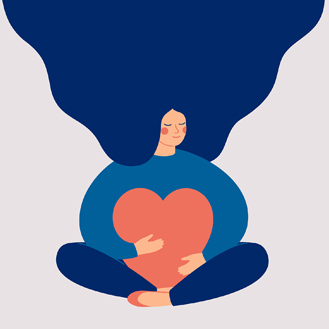
This article includes discussion of body image, weight and body dissatisfaction that may be challenging for some readers.
October 21, 2021
By Abby Watson, MS4, Drexel University College of Medicine
Medical professionals are regular people, too, which means we struggle with the same problems that everyone else does. For me, I struggle with my weight. Really, I struggle with my self-image, a very common issue for many people. Thousands of dollars of medical education has taught me that its actually not healthy to hate your body.
Body image disturbance is a distorted view of how we look, soaked in self-loathing. It is one of the diagnostic criteria for anorexia nervosa and bulimia nervosa. Many studies have shown that it is not only a symptom of these eating disorders but is also a risk factor for developing them. There are multiple components of body image disturbance: cognitive-affective, perceptual and behavioral.
The cognitive-affective component encompasses things like body dissatisfaction and body weight and shape concerns. Body dissatisfaction can be identified by having one draw the shape of their body. The difference between what they drew and what they actually look like is representative of body dissatisfaction. Weight and shape concerns highlight the undue influence of our bodies on our self-esteem.
The perceptual component is how we mentally view ourselves and our bodies . Distortion in this can lead to body dissatisfaction. And finally, the behavioral component shows itself in patterns of “frequently weighing, touching or pinching of certain areas of the body and measuring the circumference of body parts” (Ahrberg et al., 2011). We may avoid settings like pools, wear baggy clothing, or avoid situations where there’s a particular emphasis on appearance, like dances.
Body dissatisfaction is very common and affects anywhere from 30% to 75% of people, depending on what group of people you look at. It tends to be highest among adolescents, young adults and women. Body image misperception can be as high as 50% (Hosseini et al., 2021).
Feeling badly about your body can involve distortions of how you mentally picture yourself and lead to behaviors that reinforce this. For example, if I hate the number that is my weight, I may check it every day, which in turn may make me hate my body more. These types of behaviors lead to further fixation and dissatisfaction.
Society puts a lot of pressure on us to look a certain way. It’s not easy, but we can fight back. We can work to love our bodies as they are, whatever their shape or size. Shifting the focus away from things like our weight or body shape, and onto behaviors like including nutritious food in our diet and incorporating joyful movement into our lives can help us take steps toward healthier living. One of the most important things we can do to improve our health is to learn to appreciate what our body can do for us rather than what it looks like. If your goal is to get healthier, focus on objective measurables like endurance, strength and flexibility. As these improve, so does wellbeing, even if our weight or clothes size don’t change. Constant attempts to “fix” or change the way our bodies look, and the emotional and physical stress of body dissatisfaction, take a tremendous toll on our health and wellbeing. Instead of focusing on getting smaller or bulking up or getting six-pack abs, let’s focus on some things that actually improve our health. Let’s strive to change our relationship to our body, to appreciate and care for it rather than be in constant struggle with it.
Drexel's Employee Assistance Program is available to help employees in need of support through confidential, 24/7 counseling at 888.628.4824. This is offered at no cost to benefits-eligible faculty and professional staff, their family members, and Drexel graduate students. More information is available on the Human Resources website. Students can reach out for support via Student Wellbeing.
Sources/Resources:
- "Body Image Disturbance in Binge Eating Disorder: A Review"
Ahrberg, M., Trojca, D., Nasrawi, N., & Vocks, S.
(2011). European Eating Disorders Review, 19(5), 375–381. https://doi.org/10.1002/erv.1100
- "Body Image Distortion"
Hosseini, S.A., Padhy, R.K.
[Updated 2021 Jul 25]. In: StatPearls [Internet]. Treasure Island (FL): StatPearls Publishing; 2021 Jan-Available from: https://www.ncbi.nlm.nih.gov/books/NBK546582/
- https://haescommunity.com/